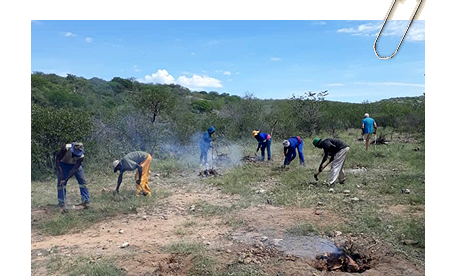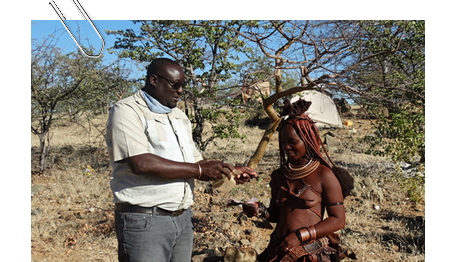Namibia Chamber of Environment (NCE) Drought Relief work support to Communal conservancies
The Kunene Region where IRDNC pioneered Community-Based Natural Resource Management (CBNRM), is the third poorest region in the country, with a poverty rate of almost 40%. The Kunene, comprising of 115,260 km² and 88,300 inhabitants, had an unemployment rate of 36% of the labour force according to the 2011 national census.
Despite the region’s spectacular mountainous landscapes and free-ranging wildlife, including the world’s largest population of free-roaming black rhinos and desert-adapted lions and elephants; its remoteness, difficult terrain, long distances, aridity, and limited capacity of some conservancies intensified the impacts of the recent drought lasting close to five years, which has exacerbated an already marginalised community.
Namibia Chamber of Environment (NCE) provided a grant of N$1 million to IRDNC to facilitate the “Cash-For-Work” project in supporting short-term employment during the drought period. Beneficiaries were chosen by the conservancy committees who targeted the people most affected by the drought. There were more than 186 beneficiaries in 11 conservancies in Kunene. They were paid N$100 a day for the work done. This drought relief programme began in late 2019 and it ended in June 2020.
The Kunene’s sparse human settlement due to the mountainous landscapes and harsh environmental conditions makes room for wildlife and has tourism potential. The Cash-for-Work projects therefore prioritised tourism development work in current under-developed conservancies, i.e. establishing rudimentary 4x4 access tracks, hiking trails, hiking camp and picnic sites, hides and viewpoints. Community members serviced and cleared 175 km of game count routes and 21.5 km of tourism access tracks.
The Cash-For-Work project had a positive impact in the lives of beneficiaries as most were living in large extended families with little or no cash income. Many farmers had lost all or most of their livestock because of drought. Lockdown restrictions due to the Covid-19 pandemic from March to June, made it more difficult to find work. Furthermore, this placed additional burdens on households as their children were at home and not at school hostels. This was a time of real hardship when for many there was only one meal a day and, or no meal as no food some days. The cash provided the flexibility to buy food and rebuild devastated livestock herds or to use income for school fees.
Cash-For-Work demonstrated the usefulness of linking drought relief to cash for work that can have a developmental impact. The opening up of tourism infrastructure will have the multiple effects of contributing to income generation in the conservancies and more diverse livelihoods for local people, while also contributing to biodiversity conservation.
Despite the positive impacts of the Cash-For-Work Programme, the cash paid is only temporary, the drought is continuing in many areas and without the income from the programme people will continue to struggle. A drought or other emergency relief scheme needs to be in a broader national welfare system that contributes to strategies that promote sustainable economic growth. Diversification of rural livelihoods through development of a wildlife/biodiversity/ green economy and other opportunities.

- New track to link Okozongwehe and Okatjavazandu game count routes in Orupupa Conservancy

- Mr Pehi Kozohura, IRDNC Staff paying out cash to beneficiary at Okangujezo, June 2020.



